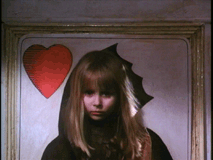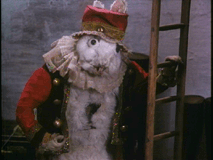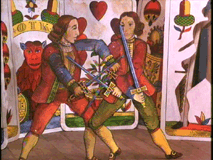Alice (Jan Svankmajer) 1988
 At once far more faithful to its source material than the
popular Disney version, and farther from it in tone than one might ever imagine,
master Czech animator Jan Svankmajer’s Alice (Neco z Alenky) is a
memorable and unique film experience, that feels strangely unlike anything else
you’ve seen, even when it’s at its most strangely familiar. Filmed in a
decaying Wonderland that is filled with creatures that are as scary as they are
surreal, the movie turns Carroll’s novel even more explicitly into an
examination of a young girl’s psyche. The first moments of the film reveal the
novel’s opening, in which Alice lounges on a riverbank with her bookish
sister, as an imaginary construct, and the rest of the story’s adventures take
on an acute sadness as a result. If this Alice has to invent even her boring
sister, the creation of Wonderland seems a desperate cry for help from a
profoundly lonely girl. The room that represents her reality is filled with
sundry artifacts that all turn up later in her fantasy, and all along, we’re
reminded that the film is a dream, since whenever a character speaks, we see an
extreme close-up of the girl’s lips narrating the story. This approach results
in an uneasy alliance with the movie, since we want to fall into the fantasy
completely, but cannot ignore the functions that it serves to us as viewers
since Svankmajer is always reminding us of its falsehoods.
At once far more faithful to its source material than the
popular Disney version, and farther from it in tone than one might ever imagine,
master Czech animator Jan Svankmajer’s Alice (Neco z Alenky) is a
memorable and unique film experience, that feels strangely unlike anything else
you’ve seen, even when it’s at its most strangely familiar. Filmed in a
decaying Wonderland that is filled with creatures that are as scary as they are
surreal, the movie turns Carroll’s novel even more explicitly into an
examination of a young girl’s psyche. The first moments of the film reveal the
novel’s opening, in which Alice lounges on a riverbank with her bookish
sister, as an imaginary construct, and the rest of the story’s adventures take
on an acute sadness as a result. If this Alice has to invent even her boring
sister, the creation of Wonderland seems a desperate cry for help from a
profoundly lonely girl. The room that represents her reality is filled with
sundry artifacts that all turn up later in her fantasy, and all along, we’re
reminded that the film is a dream, since whenever a character speaks, we see an
extreme close-up of the girl’s lips narrating the story. This approach results
in an uneasy alliance with the movie, since we want to fall into the fantasy
completely, but cannot ignore the functions that it serves to us as viewers
since Svankmajer is always reminding us of its falsehoods.
 The presentation of Alice’s fantasy itself is as boldly
conceived as the film’s setup. The movie is unabashedly indulgent in many of
Svankmajer’s recurring themes (visible in nearly all of his short and feature
films), such as his obsession with routine and his dismissive observations of
the process of eating. The act of eating always seems to be a fruitless exercise
in self-preservation (since the food ends up exiting us anyway), and the food
itself is usually fraught with hidden dangers (nails, bugs, and magic that makes
Alice change in size). Most routines here are built upon the senselessness that
Wonderland thrives on. That we’re seeing an innocent girl questioning the
sense of them makes them feel all the more irrational. Logic is applied
liberally throughout, to the point where it be comes wholly illogical, and as a
result the film seems to underline, with a child’s guileless point of view,
some of the nonsense that is inherent in our society’s way of thinking. Most
of all, though, these themes suggest the alienated Alice’s growing
dissatisfaction with the civilization that surrounds her dawning, but
incomplete, realizations of how the world works, and provides what might be the
reasons behind her retreat into a dream world. The movie becomes nothing less
than then Buñuellian rant against the ills of consumerist society, but it never
betrays Carroll’s framework, which had a bit of a revolutionary spirit itself.
The presentation of Alice’s fantasy itself is as boldly
conceived as the film’s setup. The movie is unabashedly indulgent in many of
Svankmajer’s recurring themes (visible in nearly all of his short and feature
films), such as his obsession with routine and his dismissive observations of
the process of eating. The act of eating always seems to be a fruitless exercise
in self-preservation (since the food ends up exiting us anyway), and the food
itself is usually fraught with hidden dangers (nails, bugs, and magic that makes
Alice change in size). Most routines here are built upon the senselessness that
Wonderland thrives on. That we’re seeing an innocent girl questioning the
sense of them makes them feel all the more irrational. Logic is applied
liberally throughout, to the point where it be comes wholly illogical, and as a
result the film seems to underline, with a child’s guileless point of view,
some of the nonsense that is inherent in our society’s way of thinking. Most
of all, though, these themes suggest the alienated Alice’s growing
dissatisfaction with the civilization that surrounds her dawning, but
incomplete, realizations of how the world works, and provides what might be the
reasons behind her retreat into a dream world. The movie becomes nothing less
than then Buñuellian rant against the ills of consumerist society, but it never
betrays Carroll’s framework, which had a bit of a revolutionary spirit itself.
 If Alice is never
explicitly frightening, it also never becomes mundane enough that you can feel
comfortable while watching it, but we probably shouldn’t be complacent while
viewing a portrait of a socially disaffected child. The jittery spasms of
Svankmajer’s creations and the general unattractiveness of Alice’s
surroundings make this a film that probably isn’t appropriate for children,
but the ideas that the movie is trying to get across would be over their heads
anyway. Instead of dumbing down Carroll’s novel, as Disney’s animated
feature did, Svankmajer tries to understand what it is that makes its youthful
protagonist tick. If he doesn’t seem to come to the same conclusions that
Carroll did, he certainly makes a film that offers a compelling alternative
reading. Also, since Alice is nearly
free of dialogue, its American release represents one of the few instances in
which dubbing doesn’t noticeably detract from the viewing experience.
If Alice is never
explicitly frightening, it also never becomes mundane enough that you can feel
comfortable while watching it, but we probably shouldn’t be complacent while
viewing a portrait of a socially disaffected child. The jittery spasms of
Svankmajer’s creations and the general unattractiveness of Alice’s
surroundings make this a film that probably isn’t appropriate for children,
but the ideas that the movie is trying to get across would be over their heads
anyway. Instead of dumbing down Carroll’s novel, as Disney’s animated
feature did, Svankmajer tries to understand what it is that makes its youthful
protagonist tick. If he doesn’t seem to come to the same conclusions that
Carroll did, he certainly makes a film that offers a compelling alternative
reading. Also, since Alice is nearly
free of dialogue, its American release represents one of the few instances in
which dubbing doesn’t noticeably detract from the viewing experience.
* * * 1/2
06-11-02
Jeremy Heilman